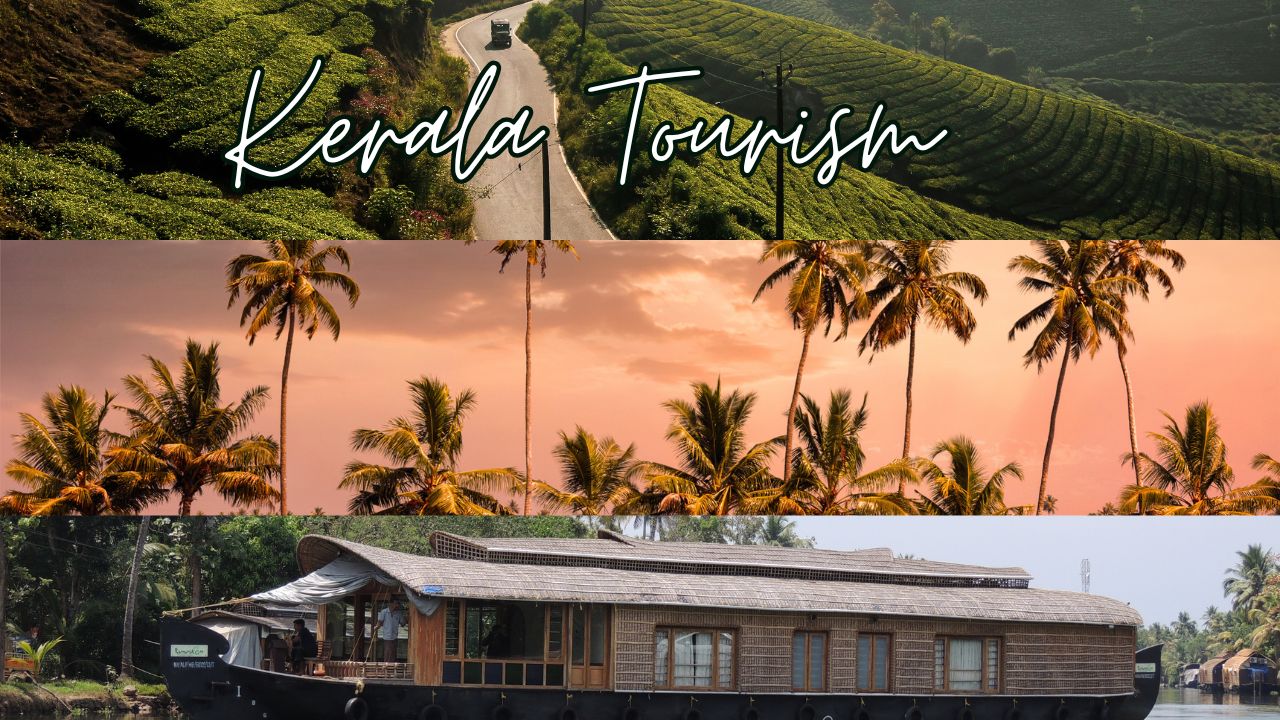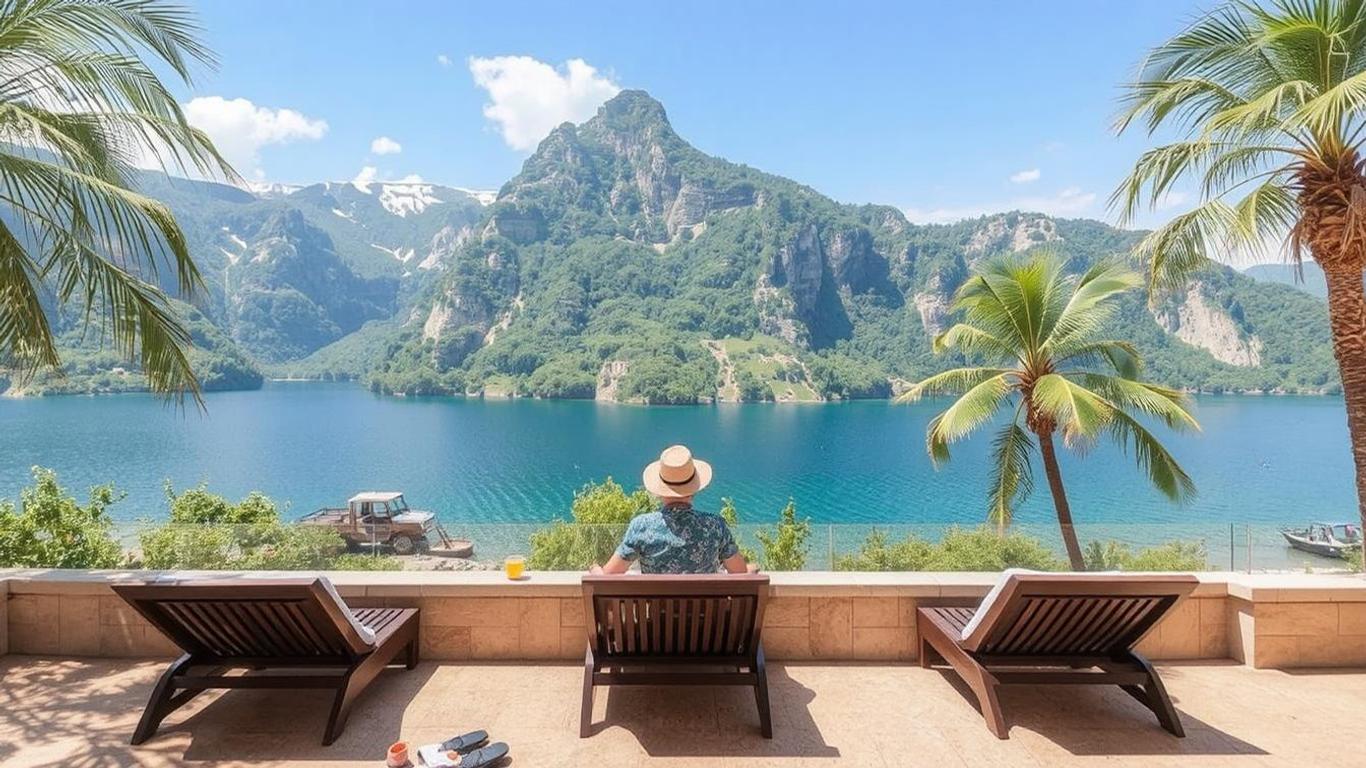Kerala Tourism: A Deep Dive into India’s Coastal Gem
Introduction to Kerala Tourism
Kerala Tourism is one of the strongest pillars of India’s travel economy, celebrated for its cultural richness, clean environment, and serene lifestyle. Nestled between the Western Ghats and the Arabian Sea, Kerala offers a mix of coastal charm, traditional architecture, Ayurveda, spice plantations, and backwaters.
This southern Indian state is not just a destination—it’s a unique way of life. With responsible tourism initiatives, deep-rooted customs, and a balanced ecosystem, Kerala Tourism represents a harmonious relationship between nature and human values.
The Backwaters That Define Kerala Tourism
Kerala’s backwaters are the signature element of its tourism identity. These are a network of canals, rivers, and lakes that form an aquatic highway across the state. Houseboats glide through the backwaters, giving travelers a glimpse into the quiet lives of the people who live along their banks.
Alleppey (Alappuzha) is the most prominent backwater hub. Staying overnight on a houseboat gives visitors a chance to enjoy local cuisine, rural surroundings, and calm waters. Kumarakom, Ashtamudi, and Kollam are other well-known backwater routes that offer rich biodiversity and cultural interactions.
Traditional Villages and Cultural Roots
Kerala Tourism remains closely connected with its roots. Many travelers prefer to visit heritage villages and experience traditional ways of life. The state’s culture includes folk dances like Theyyam, Kathakali, and Mohiniyattam, which are regularly performed in temples and cultural centers.
Visitors can engage with local artisans, witness mural painting, pottery, and even take part in coir making or handloom weaving. These experiences are organized by village tourism programs and community-led initiatives, which aim to preserve the native lifestyle while educating visitors.
Ayurveda and Wellness in Kerala Tourism
Ayurveda, the ancient system of healing, is one of the pillars of Kerala Tourism. The state’s climate and abundance of medicinal herbs make it an ideal location for authentic Ayurvedic treatment. Travelers often come to Kerala for rejuvenation therapies, detoxification programs, and preventive healthcare.
Recognized Ayurvedic centers are available in almost every district, from beachside resorts in Varkala and Kovalam to hill-based clinics in Wayanad and Thekkady. Treatments range from short massages to long-term wellness packages involving diet, yoga, and meditation.
Kerala’s Coastline and Its Quiet Beaches
Unlike overcrowded beach destinations, Kerala offers a quieter, more meaningful coastal experience. Kerala Tourism has promoted eco-conscious beach development that respects local culture and marine biodiversity.
Kovalam, Varkala, Marari, and Bekal beaches are some of the most visited spots. Each has its own character—Kovalam is vibrant with traditional fishing activity, while Varkala is spiritual and calm. Travelers often engage in yoga, Ayurvedic spa sessions, and seafood dining right by the waves.
Hill Stations That Refresh and Inspire
Kerala is home to several hill stations that provide a cool, peaceful retreat from the humid coast. Munnar is the most iconic hill town, filled with tea gardens, misty roads, and colonial architecture. Other destinations include Wayanad, Ponmudi, Vagamon, and Thekkady.
These highland areas are not only pleasing to the eye but also play a significant role in Kerala’s ecological balance. Trekking, plantation tours, birdwatching, and forest hikes are common activities. Kerala Tourism has ensured that these areas are preserved through sustainable visitor management.
Festivals and Rituals That Drive Kerala Tourism
Cultural festivals are central to Kerala’s identity. These festivals are not just for locals; they attract global travelers who seek authentic Indian experiences.
Onam, the harvest festival, showcases traditional art, games, and community feasts called ‘Sadya’. Thrissur Pooram is a grand temple festival with decorated elephants and percussion orchestras. Other important festivals include Vishu, Navaratri, and the boat races during monsoon.
Kerala Tourism often collaborates with local communities to make these festivals more accessible and organized for visitors without altering their authenticity.
The Food Trail of Kerala Tourism
Kerala’s cuisine is a blend of flavors influenced by geography, history, and culture. Coconut, curry leaves, black pepper, cardamom, and seafood form the core of its cooking. Each region has distinct recipes, from Malabar biryani in the north to Sadhya in central Kerala and spicy fish curries in the south.
Food tourism is an emerging segment of Kerala Tourism. Many travelers opt for homestays to enjoy authentic meals, attend cooking classes, or join spice plantation tours to understand the origins of Kerala’s culinary identity.
Wildlife and Ecotourism Areas
Kerala Tourism has put significant effort into protecting its forests and wildlife. The state has several national parks, biosphere reserves, and sanctuaries that are home to rare flora and fauna.
Periyar Tiger Reserve in Thekkady is known for elephant sightings and boat safaris. Silent Valley National Park, Wayanad Wildlife Sanctuary, and Eravikulam National Park are other vital conservation areas. These locations offer trekking, jeep safaris, bamboo rafting, and nature camps, guided by trained eco-guides.
Responsible Tourism and Community Engagement
What sets Kerala Tourism apart is its focus on responsible and inclusive development. The state was one of the first to implement Responsible Tourism Mission programs that prioritize local participation, environmental care, and fair-trade practices.
Travelers who opt for community-based travel enjoy village walks, storytelling sessions, and craft interactions while contributing directly to the livelihoods of local people. This model has made tourism more sustainable and respectful.
Architecture and Sacred Spaces
Kerala’s architecture reflects its heritage—low-slung roofs, wooden structures, and inner courtyards designed for a tropical climate. The temples, churches, and mosques of Kerala are not just religious centers but also architectural marvels.
Padmanabhaswamy Temple in Thiruvananthapuram, Guruvayur Temple in Thrissur, and Paradesi Synagogue in Kochi are often included in Kerala Tourism circuits. Many travelers also visit historic forts and palaces like the Bekal Fort and Mattancherry Palace.
Urban Centers with Cultural Pulse
While nature plays a big role in Kerala Tourism, its cities are equally important. Kochi is a creative hub where art, history, and cuisine meet. It hosts the Kochi-Muziris Biennale, one of the most prestigious contemporary art exhibitions in the country.
Thiruvananthapuram is the administrative capital and houses museums, galleries, and important institutions. Kozhikode, formerly Calicut, was a key trading post in the spice route and retains much of its cultural identity through literature, food, and music.
Houseboats, Canoes, and Water Culture
Apart from houseboats, smaller water-based experiences are gaining attention in Kerala Tourism. Canoe tours take visitors deeper into narrow canals, giving them a more intimate perspective of village life.
The Nehru Trophy Boat Race and other traditional snake boat races during the monsoon are deeply symbolic events. They attract visitors who come to witness the synergy of community spirit, teamwork, and historical pride.
Crafts and Handmade Traditions
Kerala Tourism also highlights the region’s rich craft heritage. Coir products, handloom textiles, bell metal craft, and wood carving are some of the timeless art forms kept alive by local artisans.
Visitors often purchase souvenirs directly from craft villages or participate in workshops to understand the value of handmade work. The government promotes these interactions through state-run emporiums and cooperative outlets.
Spiritual and Healing Journeys
Many travelers come to Kerala for inner peace. The state is home to various ashrams, yoga centers, and spiritual retreats. Places like Sivananda Ashram in Neyyar Dam or Amma’s Ashram near Kollam are well-known centers for self-reflection and learning.
Meditation, silent retreats, and yogic disciplines are integral parts of this side of Kerala Tourism. They attract both beginners and experienced practitioners seeking mental clarity and emotional grounding.
Conclusion: Why Kerala Tourism Is Timeless
Kerala Tourism continues to evolve while staying true to its roots. It is not shaped by large theme parks or artificial experiences but by real people, real places, and real stories.
Whether you are looking for health, heritage, silence, or interaction, Kerala offers it with grace and authenticity. Its strength lies in its balance—a place where traditions coexist with progressive ideas, and where the visitor becomes a respectful participant rather than just a spectator.
For those seeking depth in their travel, Kerala Tourism stands as a meaningful journey, not just a destination.













